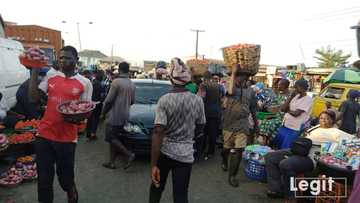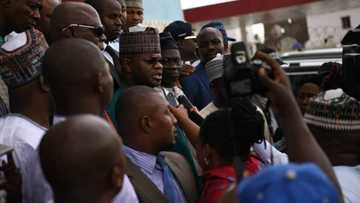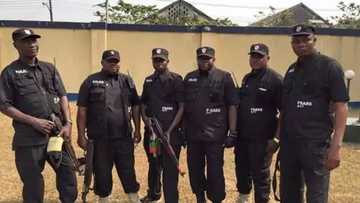Coronavirus: NCDC releases guidelines for elections ahead of Edo, Ondo governorship polls
- The NCDC has released guidelines on how to safely conduct elections amid the coronavirus pandemic
- Mandatory use of face masks, use of hand sanitizers, physical distancing, virtual campaigns are some of the recommendations in the guidelines
- The guidelines are for INEC, politicians, voters, polling staff, and so on
PAY ATTENTION: Click “See First” under the “Following” tab to see Legit.ng News on your Facebook News Feed!
As the governorship elections in Edo and Ondo states draw nearer, the Nigeria Centre for Disease Control (NCDC) has issued guidelines on how to conduct the polls safely amid the coronavirus pandemic.
The director-general of the NCDC, Dr Chikwe Ihekweazu, made this known on Monday, July 6, in Abuja during the briefing of the Presidential Task Force on COVID-19.
He urged the Independent National Electoral Commission (INEC), parties, politicians and election monitors to adhere strictly to the guideline and bearing in mind that the deadly virus thrives in mass gathering.
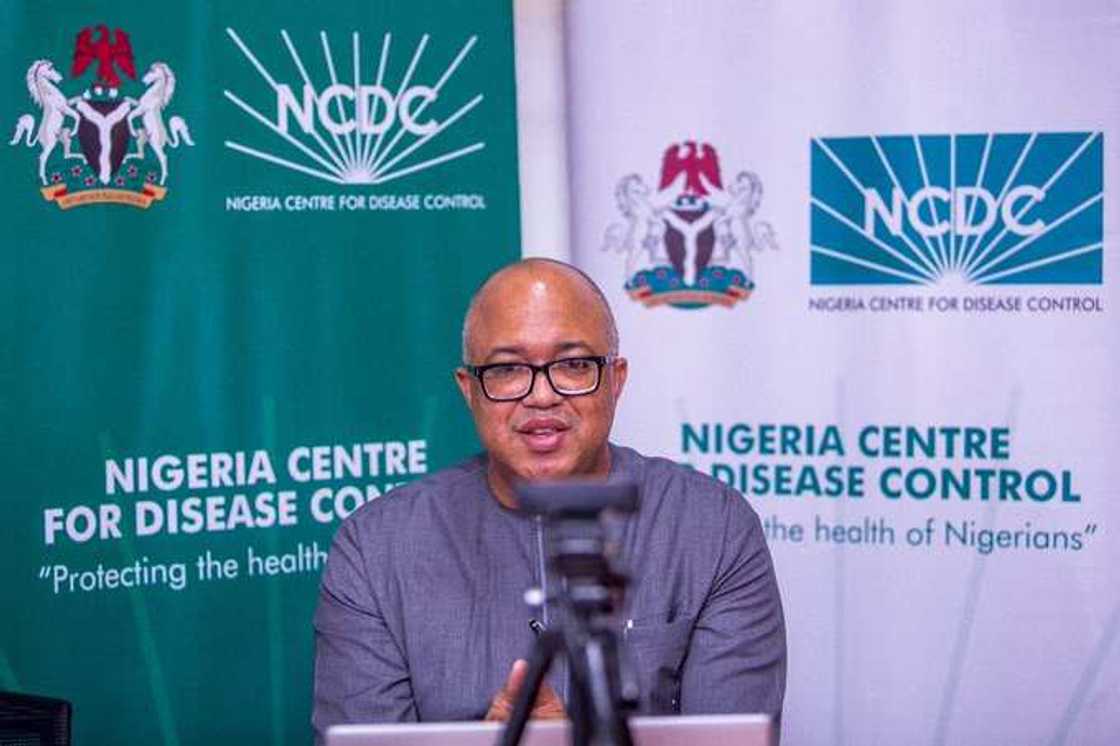
Source: Twitter
The guidelines include:
Pre-Campaign Period: For INEC
1. Develop and publicise voters’ code of conduct including what is expected of voters to adequately protect themselves from COVID-19 at polling stations.
2. Educate all election staff and volunteers on voting process and measures put in place to protect them.
3. Develop and publicise code of conduct for political parties including COVID-19 public health and social measures to be adhered to during campaigns and elections.
For State Ministries of Health (Health Educators)
4. Create awareness and understanding of the spread of COVID-19 in the country:
5. Provide information to ensure that people in states where election will take place, are aware of the risks of contracting COVID-19 and that due to community transmission, the numbers are more likely to rise.
6. Notify the general public about what is being done to protect them including the preventive measures put in place.

Read also
Coronavirus: Engaging activities you can do to avoid boredom following the stay at home order
7. Notify the general public of the importance of preventing and controlling the spread of the virus.
8. Emphasise that everyone has a role and responsibility in protecting themselves and their loved ones from COVID-19
9. Educate the general public on how to recognise the symptoms of COVID-19
10. Provide information on the symptoms of COVID-19; including rare symptoms.
11. Encourage the public to self-isolate if they experience any of the symptoms or have had history of contact with a confirmed case of COVID-19
12. Provide information on the state helplines and advice on how to seek medical care if there is a suspect case of COVID-19.
For Politicians
13. Publicise and adhere to codes of conduct developed by INEC, including public health and social measures expected at rallies and election locations
Campaign Period: For Politicians
14. Avoid utilising campaign venue to full capacity; one-third of venue capacity recommended
15. If essential, multiple rallies should be conducted with appropriate numbers of people to enable adequate physical distancing in each gathering per time
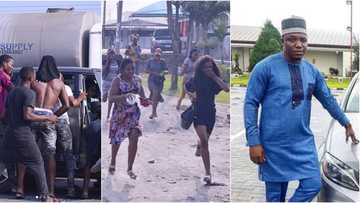
Read also
Xenophobia: Nigerians are worse than South Africans - Comedian Hyenana reacts to ongoing protest in Nigeria
16. Hand hygiene facilities including soap and water/ hand sanitisers should be made available for people before entering the campaign ground.
17. The use of face masks must be mandatory for everyone attending the campaign rally.
18. Where applicable, virtual campaigns and rallies are encouraged. This can be done using televised or radio campaigns, and mobile vans.
For INEC
19. INEC should engage all political parties to agree on the size of campaign and duration of same in line with the guideline of NCDC on mass gathering.
20. Venues for voter’s registration and collection of voter’s cards should be organised, have markings to keep people two metres away from each other, with handwashing facilities made available.
21. Mandatory use of face masks for everyone attending the campaign rally.
22. Temperature checks should be carried out at the entrance/gate before any individual enters the campaign ground. Anyone with a temperature above 37.5°C should not be allowed into the campaign ground.
Election Period
23. Temperature checks should be carried out at the entrance/gate before any individual enters the polling stations. Any individual with a temperature above 37.5°C should not be allowed into the polling station.
24. Multiple handwashing points and/or alcohol-based hand sanitisers should be provided, based on the estimated number of voters in that polling station.
25. There should be clearly marked floors and demarcation to enforce 2 metres spacing on queues.
26. All voters must wear face masks correctly at the polling station. There should be no entry without face masks.
27. Polling stations should have adequate ventilation and be well lit.
28. The surfaces (tables) must be regularly cleaned with soapy water or disinfectants.
29. Ambulances should be stationed and readily available in case of health emergencies.
Polling station staff
30. Staff should be on the lookout and stay at home if they have a fever, respiratory symptoms, or feel generally unwell
31. Provide a temperature control point at the entrance of the polling station to check voter’s temperature, and people with a high temperature should be asked to go home.
32. All polling unit staff should practice hand hygiene frequently: wash hands often with soap and water or use sanitizers
33. Regular cleaning of equipment and minimise use of shared materials unless they are adequately cleaned before reuse.
34. Voters should be advised to not touch their faces until they wash or sanitize their hands after thumb printing the ballot paper
35. After counting ballot papers, polling staff should not touch their faces until they wash their hands with soap and water or clean with alcohol-based hand sanitisers.
Ensuring compliance
36. State Governments and INEC must ensure the availability of handwashing stations and or sanitisers and adequate space for physical distancing in and outside all polling centers.
37. Temperature checks should be carried out at the entrance/gate before any individual enters the polling station.
Collation centres
38. State Governments and INEC must ensure the availability of handwashing stations and or sanitisers and adequate space for physical distancing in the collation centers.
39. All individuals at the collation centres must wear a face mask appropriately at all times.
40. Temperature checks should be carried out at the entrance/gate before any individual enters the collation centre.
PAY ATTENTION: Get the Latest Nigerian News Anywhere 24/7. Spend less on the Internet!
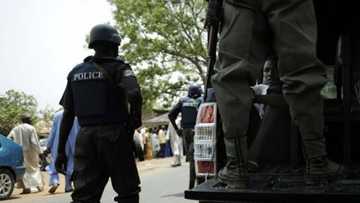
Read also
All testimonies there are from hacked accounts - Nigerian man exposes fake online Kia Rio Splash promo
Meanwhile, the federal government on Monday, July 6, again warned of a possible fresh lockdown of the country following the rise of positive COVID-19 cases among people in government positions.
In the last few weeks, Very Important Personalities (VIPs), in Nigeria including governors, members of state cabinet, prominent government officials have been contracting the deadly virus.
The chairman, Presidential Task Force on COVID-19, Boss Mustapha, gave the warning in Abuja during the task force daily briefing, adding that people in positions of authority should take safety protocols more seriously.
Mustapha while noting that if the need arises the task force will not hesitate to advise that the nation is on lockdown, however, said it would be determined by the events of the coming weeks.
He added in order to protect Nigerians, the task force will not shy away from a lockdown to achieve this.
“I believe as the days and weeks ahead will present, we will not speculate what will happen in the future but we will do everything within our mandate to ensure the safety and protection of the people of Nigeria. If that will recommend a prescription of a lockdown, this task force will not shy away from its responsibilities.
“We will take that decision, make our recommendations to Mr president who will finally decide. What will happen in the next two to three weeks will determine our recommendation,” he said.
Nigeria currently has 29,286 confirmed cases of Covid-19, 11,828 recoveries and 654 deaths. All the 36 states of the federation and the FCT now have confirmed cases of the infectious virus.
How Nigeria's Covid-19 cases rose from 7000 to over 20,000 in one month | Legit TV
Source: Legit.ng


